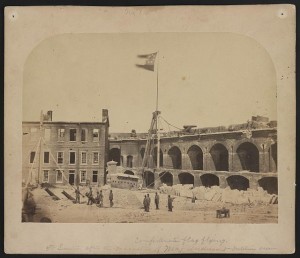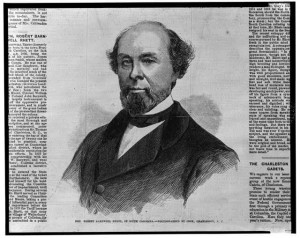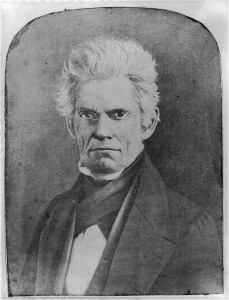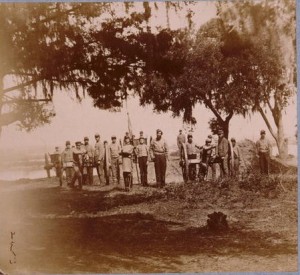Intra-regimental “Affair of Honor”: 1st South Carolina Artillery’s second-in-command takes out his superior officer
It seems noteworthy when the son of the famous secessionist fire-eater Robert B. Rhett kills the nephew of John C. Calhoun, the great champion of Southern states’ rights and promoter of nullification. The duel in this report happened in September. It was reported in Richmond 150 years ago yesterday.
From the Richmond Daily Dispatch October 24, 1862:
The duel at Charleston.
–The late fatal duel at Charleston, S. C., resulting in the death of Col. W. R. Calhoun, of the 1st Reg’t S. C. Artillery, at the hands of Maj. Alfred Rhett, of the same regiment, did not obtain much publicity through the papers of that city. A correspondent of the Mobile Advertiser, writing from Charleston, says it is to be the subject of legal investigation, the first case of that kind in the city courts for twenty years. The letter says:
Besides the principals and their surgeons, it is said there were six gentlemen present at the meeting–three State Senators, the Speaker of the House of Representatives of North Carolina a leading member of the State Convention, and a Captain Two of the Senators also hold commissions as officers of the army. The arrangements of the meeting were conducted throughout with the nicest regard for the etiquette of the “code,” and I have heard of several of those who were on the ground who express their belief that a more fairly-fought duel never occurred. Major Rhett, the challenged party, waived the “drop” shot, which he preferred, and shot the “rise.” He was dressed in full uniform; Col. Calhoun in citizen’s dress. Both fired almost simultaneously, Major Rhett in an instant after Col. Calhoun. The latter missed, and fell with a ball through the middle of his body. He survived only about an hour.
The quarrel which led to this unfortunate result is said to have had its origin as long ago as April, 1861, at the time of the bombardment of Fort Sumter, in what Major Rhett considered repeated official trespasses of his inferior officer. These led to the use, on his part, of offensive language; and the repetition since of these alleged trespasses, and the offensive words by which they were met, have aggravated and complicated the affair. No explanation was asked or given. The immediate cause of meeting was a recent duel between Maj. Rhett and a friend of Col. Calhoun, who, though aware of the existing difficulty, had enlogized Col. Calhoun in the presence of Maj. Rhett. Therefore, Maj. Rhett repeated his previous denunciation of Col. Calhoun, which the friend of the latter resented as an insult to himself, and demanded satisfaction. In this first duel Maj. Rhett received two fires of his adversary; be himself flying his second shot in the air. Here the meeting ended. In both duels Major Rhett was peremptorily challenged. It is said that in the latter affair it was proposed on the part of the challenger that firing in the air should not be allowed.
Rhett: The Turbulent Life and Times of a Fire-Eater by William C. Davis reviews the duel on page 507. The source of the problem began in 1861 because Alfred resented the West Point educated Calhoun being promoted over him at Fort Sumter Bad words between Alfred and Calhoun’s friend caused the first duel in August 1862. Davis and the Dispatch both noted that Robert B. Rhett’s Charleston Mercury failed to report the duel.
Alfred Rhett lived to be promoted to Colonel and to be captured at the Battle of Averasboro in March 1865.




